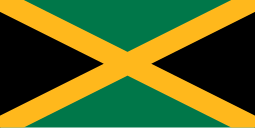Flag of Jamaica
 | |
| Names | The Cross, Black, green and gold |
|---|---|
| Use | National flag and civil ensign |
| Proportion | 1:2 |
| Adopted | 6 August 1962 |
| Design | A gold diagonal cross divides the field into four triangles of green (top and bottom) and black (hoist side and fly side) |
 Variant flag of Jamaica | |
| Use | Naval ensign |
| Design | A White Ensign with the national flag in the canton |


The flag of Jamaica was adopted on 6 August 1962 (Jamaican Independence Day), the country having gained independence from the British-protected Federation of the West Indies. The flag consists of a gold saltire, which divides the flag into four sections: two of them green (top and bottom) and two black (hoist and fly).[2][3] It is currently the only national flag that does not contain a shade of the colors red, white, or blue.[4]
Design and symbolism[]
The present design emerged from those sent in by the public in a national competition.[citation needed] It was originally designed with horizontal stripes, but this was considered too similar to the flag of Tanganyika (as it was in 1962, only the yellow stripes are thinner), and so the saltire was substituted.[5]
An earlier interpretation of the colours was, "hardships there are but the land is green and the sun shineth" as stated in the government Ministry Paper 28 - National Flag dated 22 May 1962.[6] Gold recalls the shining sun, black reflects hardships, and green represents the land. It was changed in 1996 to black representing the strength and creativity of the people which has allowed them to overcome difficulties, gold for the wealth of the country and the golden sunshine, and green for the lush vegetation of the island, as well as hope.[7] The change was made on the recommendation of the Committee to Examine National Symbols and National Observances appointed by the then Prime Minister P. J. Patterson and chaired by Milton "Rex" Nettleford.[citation needed] The flag is blazoned: Per saltire vert and sable, a saltire Or.[citation needed]
Etiquette[]
Standard etiquette applies in Jamaica to use of the national flag, primarily ensuring it is always the primary flag flown and is in good condition.[citation needed] The National Flag Code (a set of rules that owners of a flag should follow) was instituted by the government.
Jamaica's state ensign is a Blue Ensign with the Jamaican national flag in the canton; it is normally only used by the Jamaican Government.[citation needed] Jamaica's naval ensign follows the British system and is a White Ensign with a Saint George's Cross and the Jamaican national flag in the canton, although due to the island's lack of a navy, it is normally only used by the Jamaican Coast Guard.
Historical flags[]

 1875–1906
1875–1906

 1906–1957
1906–1957

 1957–1962
1957–1962

 1962
1962
See also[]
References[]
- ^ Whitney., Smith (1980). Flags and arms across the world. Smith, Whitney. New York: McGraw-Hill. pp. 111. ISBN 9780070590946. OCLC 4957064.
- ^ Jamaican Flag on JIS site
- ^ "CIA World Factbook - Jamaica". Retrieved 29 July 2019.
- ^ "Flags, Symbols, & Currency Of Jamaica". Retrieved 24 August 2021.
- ^ "Flag of Jamaica". Encyclopedia Britannica. Retrieved 2020-05-28.
- ^ "National Library of Jamaica" (PDF). Retrieved 11 February 2020.
- ^ "CIA World Factbook - Jamaica". Retrieved 29 July 2019.
External links[]
| Wikimedia Commons has media related to Flags of Jamaica. |
- Jamaican Flag on Jamaican government site
- Jamaica at Flags of the World
- Flags of Jamaica
- National flags
- National symbols of Jamaica
- Saltire flags




